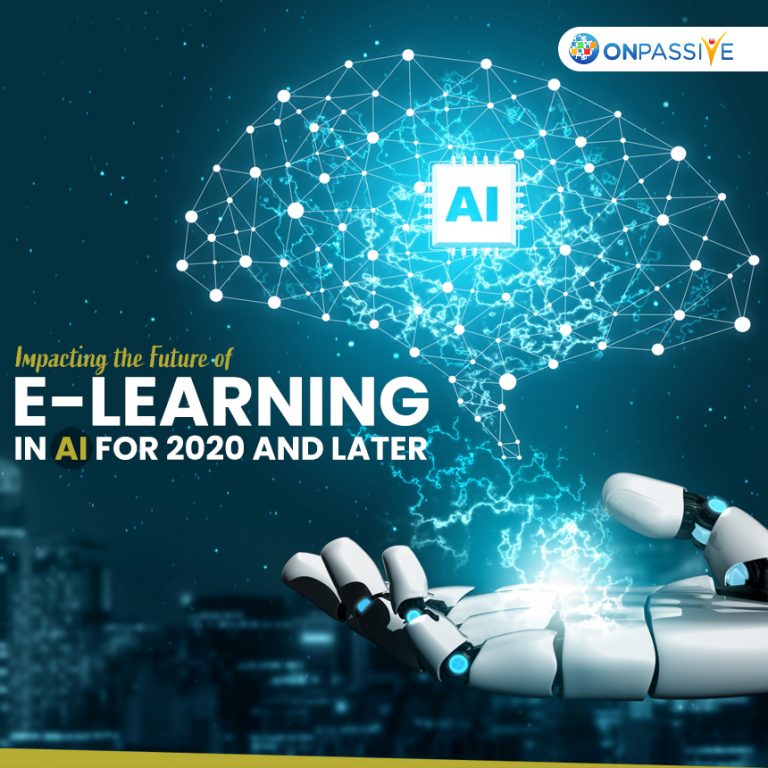
AI is expected to capture the entire eLearning industry in the coming years. It drives the education market and automates the process to increase profitability for educators and students alike.
Artificial Intelligence’s Impact on E-Learning
The most innovative tech inventions surround artificial intelligence, and almost every critical sector accomplishes specific tasks difficult for humans to achieve. At this run, AI is also driving the market for education and automating the process to increase the profitability for educators and students.
Users expect more customized content and unbeatable browsing experience. It forces web developers to think out-of-the-box rather than getting glued to old and conventional methods. AI comes into the picture for redefining all traditional approaches by shedding more focus on User Experience.
What is the need for AI in Current Environments?
People learn differently at different rates, and Artificial Intelligence tailors and personalizes learning for every individual. Additionally, AI systems can be utilized to augment tutoring and conversational education assistants with a personal approach. This autonomous tutoring helps students to learn at their own pace. AI’s benefits can bring about an educational system where ML and AI will be a core part of the future learning experiences.
How is Artificial Intelligence revolutionizing E-Learning Paradigms?
Digital learning solutions can immensely influence an educational ecosystem, and AI is leading the race. It helps students receive highly engaging lectures and intuitive aptitude tests, getting the best method to address their learning requirements. It also helps young minds make the best use of the information.

5 Ways of AI assisting students
1. Smart Content
Smart content consists of a digitized study guide that helps students to get customized learning solutions.
The traditional textbook content is now breaking down into;
- Interactive content
- Practice sessions
- Real-time feedback
- Comprehensive assessments using AI.
Educators customize the content as per the requirements, including audio and video lessons for realistic classroom environments.
2. Intelligent, Flexible and Tutoring Systems
An intelligent tutoring system is efficient in helping to teach certain subjects. This new method utilizes an ML program simulating how students learn and support teachers in designing a smart, user-friendly and flexible interface.
3. Real-Time Questionnaires
Artificial Intelligence offers the potential to work as a virtual tutor and help students in clearing their doubts. Students need to ask the AI engine and receive appropriate answers for their questions or doubts. It bridges a gap in learning and helps students in creating an improved learning environment.
4. Curating Freshly Brewed Content
Students are looking for updated and interactive content at their disposal during a content explosion within the education industry. It results in relief and harnessing fresh content for e-Learning, including high-resolution interactive images and content structure engaging students and helping them learn better.
5. Automating Administration Tasks
Grading homework and tests can get cumbersome to teachers, and any human error can affect the final result. By automating the assessment system educators will grade multiple-choice questions with the help of an AI system. It also helps create an effective Instructional Design strategy and reduce the time spent on actual course development.
Industry giants nurturing ROI by incorporating AI into systems
AI comes in as a new edition to the education world, but it has transformed many industry leaders’ business models already.
These early adopters of AI achieve benefits such as;
- Increased efficiency
- Cost Management
- Enhanced Customer Experience
- Better Revenue Growth, and much more.
Online Education Leaders
1. Duolingo
Duolingo boasts of more than three-hundred million registered users on its platform and it is the most popular app for learning foreign languages. The app offers three-minute lessons designed with a simple interface combined with gamification tricks. There are also various exercises with AI-enabled chatbots helping students achieve real-time conversations and improve their skillsets practically.
2. Massive Open Online Courses
Massive Open Online Courses offers online courses to 101 million learners in teaching and learning through videos, group chats, assignments, and tests.
MOOCs deliver courses on platforms such as;
- Coursera
- EdX
- Future Learn
- Udacity.
Each of these platforms has an impressive number of online users.
The Future
AI is stealing the show right in the e-Learning sector. Although it’s still in the nascent stage, it will capture the entire e-Learning industry very soon. Going digital in the education sector will open up a pool of opportunities for students and educators and pave the way for imparting quality education.
Conclusion
Many educators feel that AI will replace humans. But either way, it proves to be a great support system for human professionals and experts.



Petrina Haingura
3 years ago